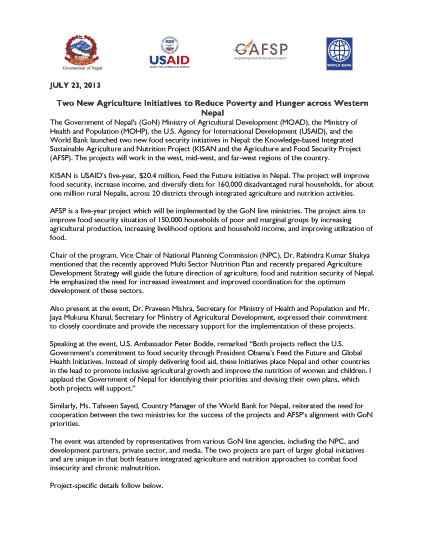For Immediate Release
The Government of Nepal's (GoN) Ministry of Agricultural Development (MOAD), the Ministry of Health and Population (MOHP), the U.S. Agency for International Development (USAID), and the World Bank launched two new food security initiatives in Nepal: the Knowledge-based Integrated Sustainable Agriculture and Nutrition Project (KISAN and the Agriculture and Food Security Project (AFSP). The projects will work in the west, mid-west, and far-west regions of the country.
KISAN is USAID’s five-year, $20.4 million, Feed the Future initiative in Nepal. The project will improve food security, increase income, and diversify diets for 160,000 disadvantaged rural households, for about one million rural Nepalis, across 20 districts through integrated agriculture and nutrition activities.
AFSP is a five-year project which will be implemented by the GoN line ministries. The project aims to improve food security situation of 150,000 households of poor and marginal groups by increasing agricultural production, increasing livelihood options and household income, and improving utilization of food.
Chair of the program, Vice Chair of National Planning Commission (NPC), Dr. Rabindra Kumar Shakya mentioned that the recently approved Multi Sector Nutrition Plan and recently prepared Agriculture Development Strategy will guide the future direction of agriculture, food and nutrition security of Nepal. He emphasized the need for increased investment and improved coordination for the optimum development of these sectors.
Also present at the event, Dr. Praveen Mishra, Secretary for Ministry of Health and Population and Mr. Jaya Mukunda Khanal, Secretary for Ministry of Agricultural Development, expressed their commitment to closely coordinate and provide the necessary support for the implementation of these projects.
Speaking at the event, U.S. Ambassador Peter Bodde, remarked “Both projects reflect the U.S. Government’s commitment to food security through President Obama’s Feed the Future and Global Health Initiatives. Instead of simply delivering food aid, these Initiatives place Nepal and other countries in the lead to promote inclusive agricultural growth and improve the nutrition of women and children. I applaud the Government of Nepal for identifying their priorities and devising their own plans, which both projects will support.”
Similarly, Ms. Tahseen Sayed, Country Manager of the World Bank for Nepal, reiterated the need for cooperation between the two ministries for the success of the projects and AFSP’s alignment with GoN priorities.
The event was attended by representatives from various GoN line agencies, including the NPC, and development partners, private sector, and media. The two projects are part of larger global initiatives and are unique in that both feature integrated agriculture and nutrition approaches to combat food insecurity and chronic malnutrition.
Project-specific details follow below.
The Knowledge-based Integrated Sustainable Agriculture and Nutrition (KISAN) Project KISAN is funded by the USAID and is part of the Presidential Feed the Future (FTF) Initiative in Nepal. The project seeks to sustainably reduce poverty and hunger in Nepal by achieving inclusive growth in the agriculture sector, increasing income of farm families and improving nutritional status, especially of women and children in over 160,000 households. USAID will implement the project from 2013-2018 with Winrock International in collaboration with five Nepali organizations: Antenna Foundation Nepal; Development Project Service Center (DEPROSC); Center for Environmental and Agricultural Policy, Research, Extension and Development (CEAPRED); Nutrition Promotion and Consultancy Services (NPCS); and Nepal Water for Health (NEWAH). KISAN will impact one million Nepalis in Kapilbastu, Palpa, Agarkhachi, Gulmi, Banke, Bardiya, Surkhet, Dailekh, Jajarkot Dang, Salyan, Rukum, Rolpa, Pyuthan, Baitadi, Kailali, Kanchanpur, Doti, Accham, Dadheldhura.
The Agriculture and Food Security Project (AFSP).
This project is funded by the Global Agriculture and Food Security Program (GAFSP). GAFSP is a global program working in 18 countries with $1.3 billion in grant funds provided by nine G20 members and the Gates Foundation. The U.S. is largest single donor to this fund. The program will be implemented by MOAD with support from MOHP, with monitoring and supervision provided by the World Bank. This project aims to improve food security situation of poor and marginal groups of population by increasing agricultural production and productivity, increasing livelihood options and household income, and improving utilization of food. The project has four main components: technology development and adaptation; technology dissemination and adoption; food and nutritional status enhancement and project management. The priority target groups of the project are small and marginal farmers, landless households, indigenous population, and Dalits. The project is to be implemented in 19 hill and mountain districts of the mid- and far-western development regions of Nepal: Darchula, Baitadi, Bajhang, Bajura, Humla, Jumla, Dolpa, Mugu, Kalikot, Surkhet, Dailekh, Jajarkot, Salyan, Rukum, Rolpa, Pyuthan, Accham, Dadheldhura and Doti.








Comment
Make a general inquiry or suggest an improvement.